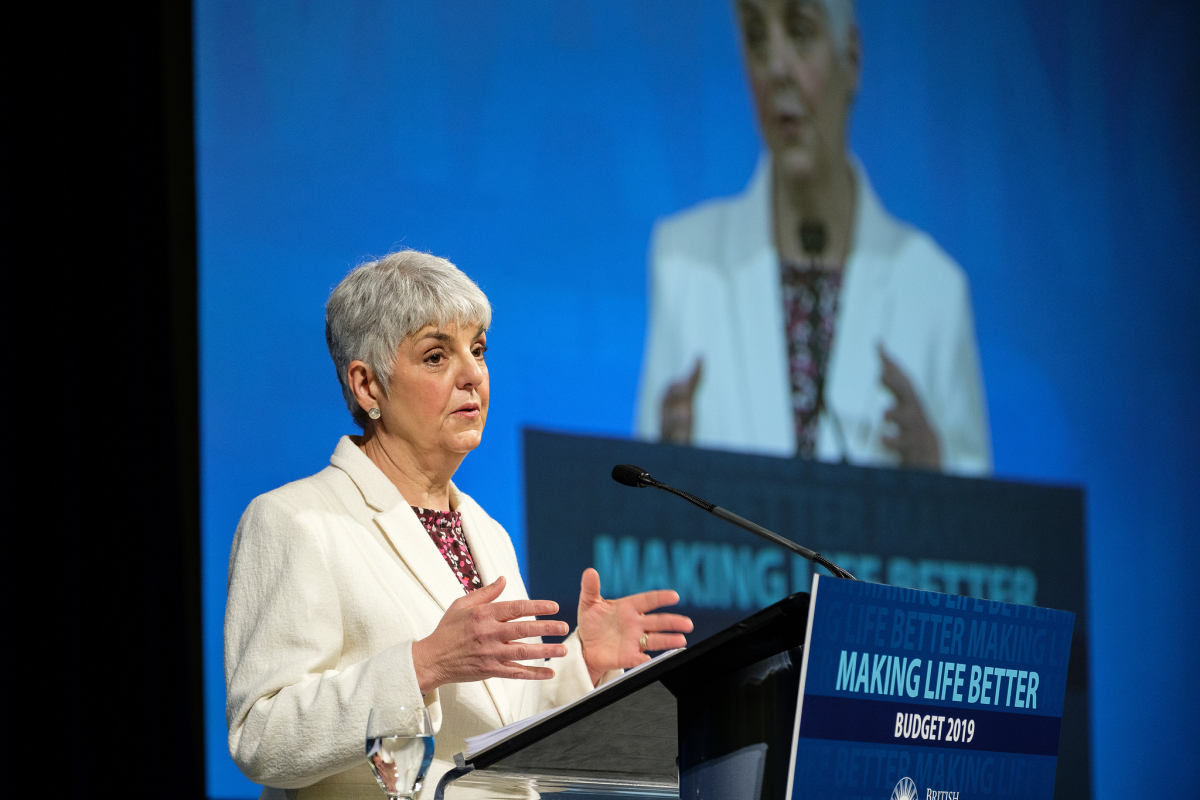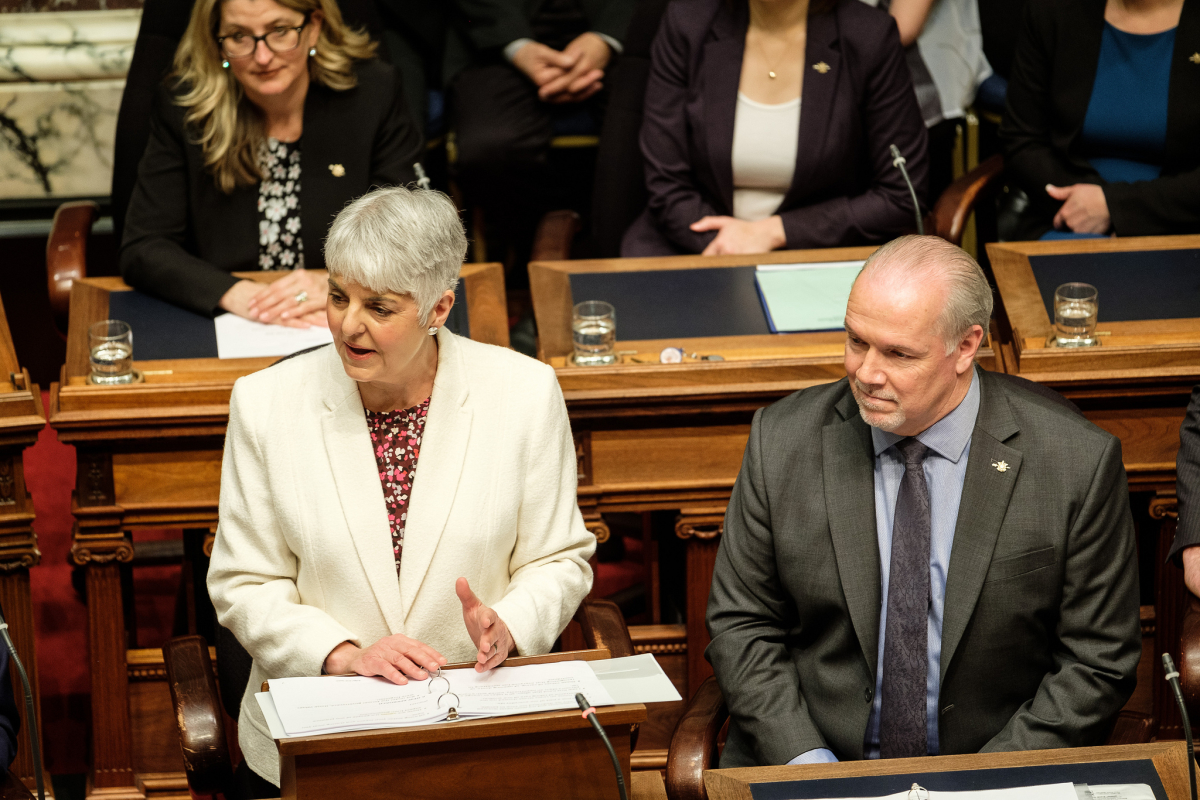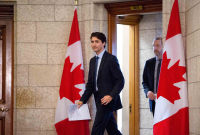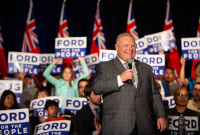Support strong Canadian climate journalism for 2025
B.C.’s Finance Minister Carole James says that there are two large risks to her three-year financial plan. One of them is the possibility of a global economic slowdown, while the other is the risk of not having enough people in B.C. to fill all of the available jobs.
But she says her new budget, tabled on Tuesday, provides balanced books as part of a plan to manage these risks.
“We have done a lot of work to try to make sure that we are mitigating that,” James said. “We’re not simply relying on a speculative real estate market. We’re putting money back into forestry, we’re supporting mining and tech is continuing to boom.”
The new budget includes significant contingency funds for all three years. But this might be compromised in the event of unexpected losses at BC Hydro and ICBC. The budget also says that global trade policies and lower commodity prices could also have a negative impact on B.C.'s finances.
James doesn’t see a crash coming for B.C.’s real estate market and she reiterated that housing is still far from affordable.
“There is no question that B.C. will always be a desirable place to live. We will continue to see economic growth. What we’re really looking for is moderation in the market,” James said.
There were no new tax measures introduced in the budget, which calls for modest growth and surpluses of more than $250 million in each year over the next three years. James introduced a new child tax credit, which will give families with children up to age 18 as much as $3,400 a year, as of Oct. 1, 2020. She said it takes a year to implement a new tax credit because of integration with the federal tax system.
James also eliminated interest on student loans and pledged to continue efforts to provide universal, affordable childcare, moderate the housing market, and hire more teachers, nurses and doctors.
B.C.’s unemployment rate is the lowest in the country at 4.7 per cent and wages have gone up 4.1 per cent in the past year, the budget documents say.
The new budget also unveiled significant new spending for the environment, First Nations and vulnerable people.

CleanBC plan funded to the tune of $900-million
The budget proposes to make $902 million in new green commitments over three years to protect the air, land and water as part of the CleanBC plan.
“(Budget 2019) looks ahead to the 21st century to unlock the potential of a green economy,” James said as she released the budget. “It asks ourselves what kind of environment, what kind of province we want to live in and what kind of world our children and grandchildren will inherit.”
BC Green Party leader Andrew Weaver said the CleanBC investment will continue to pay off in the future.
"The investment of almost $1 billion over the fiscal plan goes a long way to putting us on track to meet our targets," Weaver said in a statement.
The measures, which are part of the CleanBC plan to reduce carbon pollution in B.C. by 40 per cent by 2030, include money for incentives offered to people who retrofit their homes or buy low-emission cars. The province’s carbon emissions in 2016 were about 62 megatonnes, nearly one-tenth the national total of 704 megatonnes.
Dan Woynillowicz, policy director at Clean Energy Canada, said the budget will fully fund the CleanBC plan.
“British Columbians should be excited by this budget because it supports them upgrading their lives in ways that not only cut carbon pollution but also lower monthly energy bills—like more efficient homes and electric cars,” Woynillowicz said. While he's not certain if it's the biggest investment in the environment ever in B.C., he says he doesn't ever remember another $900 million investment for climate action.
People buying zero-emission vehicles will get rebates of up to $6,000, while homeowners can get up to $14,000 for switching to high-efficiency heating systems or upgrade their windows. That includes $2,000 to replace an oil, propane or natural gas heating system with an electric, air-source heat pump, $1,000 to upgrade doors and windows and up to $700 for a highest efficiency natural gas furnace.
“This isn’t just good for the planet, it’s good for people’s pocketbooks,” James said.
The changes are likely to have other benefits as well, such as lower fuel bills, reduced heating costs and better transit, Woynillowicz said.
"There are also other benefits ... in terms of creating new business and job opportunities as well as looking for opportunities to approve the affordability for people living in B.C.," Woynillowicz said in an interview. "When we can marry these two things, you expand the constituency of British Columbians who are going to be supportive of continuing down this path, regardless of who forms government."
In all, $107 million will be for incentives for zero-emission vehicles, funding for new charging stations, and other transportation initiatives. A further $58 million will go towards making buildings more energy efficient, including both homes and businesses and $18 million will help Indigenous and remote communities move to cleaner energy sources.
Industry, which is responsible for the lion’s share of the emissions reductions, will get $168 million in incentives to reduce their greenhouse gas emissions.
The forecast also includes $15 million to help remote communities transition to clean energy solutions. Another $299 million is allocated for initiatives that have not yet been developed or finalized, James said. That money will allow new programs to get up and running quickly, Woynillowicz said.
The budget also includes an increase in the climate action tax credit, up to $400 a year for eligible families.
James linked recent wildfires and floods to climate change.
“The increase in catastrophic wildfires and devastating floods over the past two years weigh heavily on our hearts and minds,” she said. “This past summer, when B.C. was blanketed by a dark, smoky sky, I heard many people wonder out loud if this is what we can expect for our future. British Columbians from all political stripes recognize the threat posed to our province by climate change.”
On top of the $902 million for CleanBC, the budget includes $111 million over three years to fight wildfires, including response and prevention, and another $13 million for forest restoration.
Weaver would have liked to see more money for the environment and species protection.
“Preparing for the future will continue to be a challenge. We know that climate change threatens every aspect of life in our province," Weaver said. "Government must recognize this threat and allocate funding to address the unavoidable increase in natural disasters.”
Indigenous communities get $3-billion revenue-sharing agreement
James reiterated her government’s promise to legislate the implementation of the United Nations Declaration on the Rights of Indigenous Peoples.
“I am proud to announce that Budget 2019 introduces the most substantial revenue-sharing agreement with First Nations in B.C.’s history,” James said in her speech. “This agreement is the result of decades of work and advocacy by First Nations to address the need for stable, long-term funding for their communities.”
Starting in April 2019, the province will share provincial gaming revenue with First Nations. The total is estimated at $3 billion over 25 years or $300 million over the next three years. Every First Nation will be eligible for between $250,000 and $2 million each year, the budget documents say. The money can be spent on health and wellness, housing, infrastructure, training, environmental protection, economic development, governance capacity and other expenses.
“First Nations have demanded a fair share from their territories for decades — our title and rights include an economic component that requires sharing in all sectors,” said Terry Teegee, regional chief at the B.C. Assembly of First Nations.
Judy Wilson, secretary-treasurer at the Union of British Columbia Indian Chiefs, said the revenue sharing is "an important step in recognizing the economic component to Indigenous inherent title and self-determination to make our own decisions about our territories."
Another $3 million, not part of the gaming funds and separate from the CleanBC funds, will pay for the BC Indigenous Clean Energy Initiative, which helps First Nations communities build clean energy projects.
Foster children, disabled also see benefits
The budget also includes a response to recommendations made by Grand Chief Ed John in his report on child welfare, by increasing support payments to extended family members who care for children when their parents can’t. Foster parents will get their first raise in a decade — $179 a month — and extended families will get the same supports foster parents receive. Also, foster children will now get provincial child tax benefits.
“Our government is working with Indigenous communities to reduce the number of children and youth coming into government care by shifting our focus to prevention,” the budget documents say. In B.C., 4,100 of the 6,400 children in care are Indigenous, but that’s the lowest number of Indigenous children and youth in care since 2014, the documents say. “Expanded government supports are helping to increase the rate of family preservation,” the documents say.
The budget also increases income and disability assistance rates by $50 a month, but details of the complete poverty reduction plan won’t be announced until the spring.
Trish Garner, community organizer for the BC Poverty Reduction Coalition said her group is happy to see the child tax benefit extended to age 18.
“However, the increase to welfare and disability rates of only $50 per month and the addition of only 200 modular houses is a drop in the ocean in tackling deep poverty for individuals. This is a critical gap given that one in three singles live in poverty in B.C.,” Garner said.
A single person on income assistance will now get $760 per month and a person on disability assistance will get $1,183 plus $52 for transportation, Garner said.
“Given the significant surpluses budgeted of $274 million, $287 million and then $585 million over the next three years, as well as the forecast allowances and contingency funds, we have the fiscal room to provide a much bigger increase to welfare and disability assistance rates. There is no reason to keep people struggling to survive at these shockingly low rates,” Garner said in a statement.
A comparison table listing tax rates across the country shows B.C. has among the lowest tax rates for some categories, such as a single person earning $80,000 a year, a senior couple with equal pensions earning $30,000 a year or a two-income family of four earning $90,000 a year. Tax rates are closer to the middle of the pack for a two-income family of four earning between $30,000 and $60,000 a year or for a single person earning $25,000.
James didn’t miss an opportunity to blame some of the province’s financial risk on the previous Liberal government.
“The past government made the choice to make life easier for the few at the top, at the expense of everyone else,” James said. “People were told they had to choose between a strong economy or investments in people. But the truth is, we can and must have both.”
Tracy Sherlock writes about B.C. politics for the National Observer. Send tips and comments to [email protected]






Comments
Dear Premier Horgan,
Twenty-two years ago we purchased our current home in Saanich and for the first time experienced electric heating. It was unaffordable, and that was long before Hydro began two tiered gouging. At that time both the Provincial government and BC Hydro were encouraging residential customers to convert to natural gas. Gas came to our street. We had ducting installed and a 92% efficient Lennox furnace. In a later year we had our wood insert removed and a gas insert installed.
Now, you want us to convert back. Why? Your new 40billion dollar LNG/Fracking industry is going to throw those carbon numbers of yours way out of whack. You want us to fix that by not using what you are encouraging the world to buy from us. You want to justify the need for run of river and site c dam hydro. We will leave this province before we will ever play your game. Your government is disgusting.
So you do support the initiative, because you agree LNG prevents us meeting our targets?
Or hang on, you don't support it because electric heating is too expensive?
Err, rather, you do support the initiative, as you are critical of site c and think this is just designed to justify its use... But you must know site c exists for the LNG plant?
Sorry, I have it wrong again. You actually like gas and want to use it because we are selling it anyway... but didn't you say LNG will throw or climate target off?
Your comment is throwing me in circles.
To me, this underscores the difference between an NDP government, and what is going on in Ontario....and to a lesser extent, Saskatchewan. For everyone who wants change now, and 100% of what they think change looks like, and for that complete makeover to cost them nothing, and disrupt their little world's not one tiny bit.......GROW UP.
We've been sucking at the fossil fuel teat for generations now......and their operatives are well ensconced in all our governments, economies and media outlets. We aren't going to transition out of our current reality in one election cycle....or in two.
But from this article, it seems the B.C. government is going to make a start.....and hopes many citizens will do the same. We've just gone through the same beginning transition in Alberta........and many of us have solar panels today because of the government subsidy.
Sure, we haven't raised royalties, and we're still more supportive of tarsands extraction than many of us would like. But we're also the western Canadian leader in commercial solar, and our carbon tax is providing transition funding for start up clean tech research and implementation.
And what's the alternative? Yellowjackets who want more subsidies for the very industry that raises CO2 emissions, and conservative/liberal governments who bend over backwards to provide same??
Seems to me its time to support governments trying to transition, while providing some relief to ordinary citizens. Seems to me its time to do what we can as citizens to lower emissions. This is just the beginning. Seems to me we need to join the action, not just recycle our old reactions.
Comparing this piece to the article on what Ford plans to do for Ontario students, seems to me we have a pretty clear electoral choice.....unless we all intend to bitch and complain our way into oblivion.